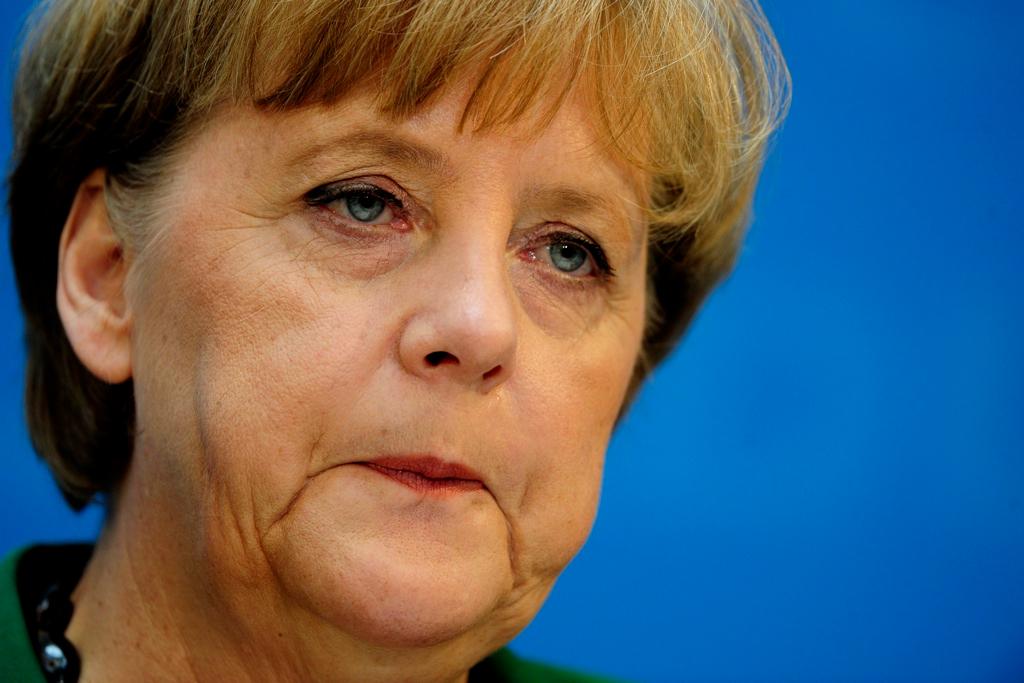Europe elections give Merkel a giant headache
German chancellor Angela Merkel comments on the outcome of regional elections in the northern Schleswig-Holstein state and voting in France and Greece at a press conference on May 7, 2012 in Berlin.
LONDON — Europe woke up with a giant headache Monday morning.
Half of France had partied all night, celebrating their election of a Socialist president who promised to soak the super rich with a 75 percent tax rate. By a narrow margin, voters rejected outgoing President Nicolas Sarkozy’s modest program of austerity. Francois Hollande now faces the daunting problem of actually carrying out his (probably unworkable) promises
The Greeks spoke louder Sunday in their legislative election. They massively rejected mainstream parties and the tax hikes and budget cuts imposed on their country by the European Union and the IMF. But there was no dancing in the streets. Their headache now is how to make a governing coalition out of the ragbag of legislators they elected, including actors, comedians and extremists of all stripes from neo-Nazis to radical leftists.
There were sore heads in Moscow, as well, after police cracked down on street protests in advance of Monday’s inauguration of Vladimir Putin. It was not just that his election was marred by fraud. A growing number of middle class Russians are becoming tired of a president who keeps coming back to the Kremlin like a bad penny.
German Chancellor Angela Merkel has her own headache now: how to deal with a French president who wants to water down the Germanic austerity she has been forcing the rest of Europe to swallow. Merkel’s government is already in trouble with its own voters, after several defeats in local elections in advance of a general election next year.
Here in Britain, despite the relative civility of political life and the less excitable nature of the voters, the government is in deep trouble. Like the rest of Europe, the British middle class is being squeezed and some experts believe the already high rate of unemployment will rise to 11 per cent in the next five years. That’s enough to make even the phlegmatic British lose their cool. The parties of Prime Minister David Cameron’s center-right coalition lost heavily in recent local elections.
If there is a common theme in all this, it is the fact that Europeans in general are in a bad mood. They are fearful of rising unemployment and angry at falling living standards. A long string of European governments of both left and right have been voted out of office as a result of the great recession that began in 2008. Politicians get credit when times are good. When times are bad, they are made to pay.
All of this gives Europeans an interesting perspective on what is happening back in the USA. Viewed from here, the American economy looks relatively healthy, even if it is not robust, and its prospects for the near term future look brighter than Europe’s. A Spaniard, whose country has a quarter of its work force unemployed sees America’s jobless rate of 8 per cent as an impossible dream. European socialists may demonize American-style capitalism but love its gadgets and popular culture. Ipads are selling like hot cakes in France this year.
Even the American government looks better by comparison with Europe. Americans, who rate their Congress lower than a snake’s belly and complain bitterly about taxes should try living in western Europe with high income tax rates not seen in the U.S. since the 1980s and national sales taxes hovering around 20 percent. If Europeans could vote in America’s election, they would gladly reelect President Barack Obama.
There is, however, one lesson that Americans could learn from the French election. Voter turnout was exemplary. Eighty percent ignored bad weather to cast their ballots. That’s not unusual in France. Countries may not always get the governments they deserve, but in France they at least get a government that represents the will of the majority.
Every day, reporters and producers at The World are hard at work bringing you human-centered news from across the globe. But we can’t do it without you. We need your support to ensure we can continue this work for another year.
Make a gift today, and you’ll help us unlock a matching gift of $67,000!
